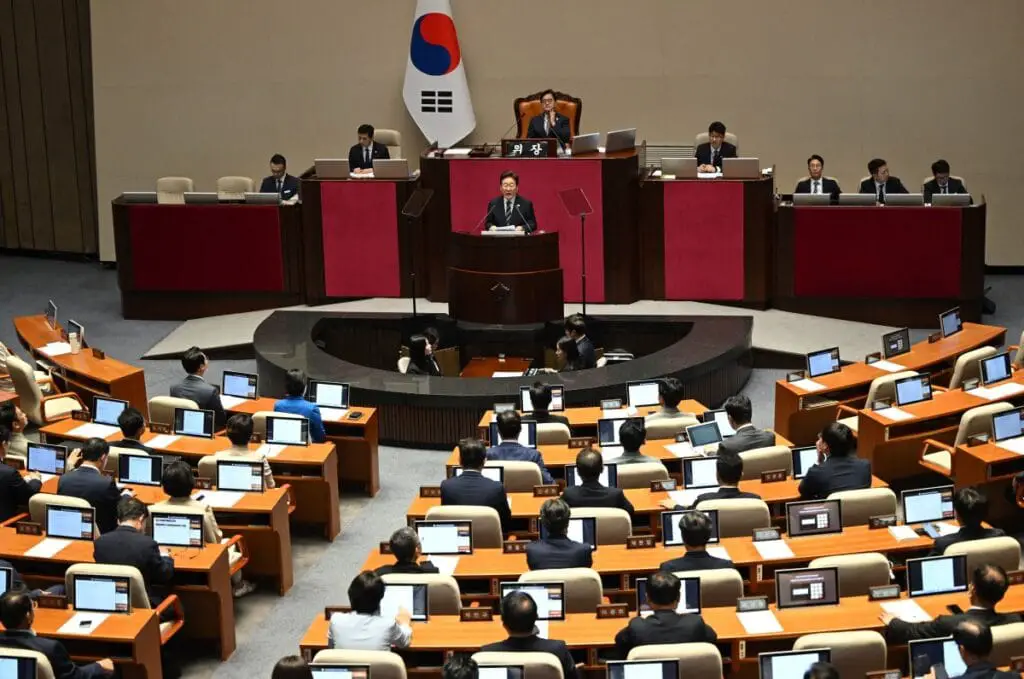August 25, 2025
SEOUL – The National Assembly on Sunday passed a contentious labor bill championed by the ruling Democratic Party of Korea, despite fierce objections from the opposition and warnings from the business community.
The amendment to Articles 2 and 3 of the Trade Union and Labor Relations Adjustment Act, widely known as the “Yellow Envelope” bill, was approved in a 183-3 vote during a morning plenary session. The legislation is designed to expand labor protections for all categories of workers while limiting companies’ ability to seek compensation for losses caused by strikes.
The bill is set to take effect in March 2026.
A total of 186 lawmakers participated in the vote, with the 107-member People Power Party boycotting the vote. Members of the minor conservative New Reform Party — Chair Lee Jun-seok and Reps. Lee Ju-young and Chun Ha-ram — were identified as the three who voted against the bill.
The main opposition People Power Party had launched a filibuster at 9:09 a.m. the previous day, with several of its lawmakers delivering speeches and engaging in debates reflecting their party’s opposition to the bill. The unlimited debate was shut down after 24 hours after at least three-fifths of all parliament members, or some 180 lawmakers, voted to end it in accordance with the National Assembly Act.
The Democratic Party currently holds a parliamentary majority with 166 out of 298 seats, while the People Power Party holds 107.
The People Power Party criticized the passage of the bill, saying that it exposed the Democratic Party as a “mere pawn” of the labor unions here, through a commentary released under the name of its senior spokesperson Choi Eun-seok. It added that the “pleas” of business leaders, the public and the opposition were “trampled upon” in the process.
Democratic Party Chair Jung Chung-rae lauded the passage of the bill, calling it a “monumental moment in history,” during an intra-party meeting of lawmakers that took place after the plenary vote.
Assembly Speaker Woo Won-shik echoed Jung’s sentiment, highlighting that the bill was first introduced back in April 2015 and expressing hope that the legislation will contribute to creating a safer and healthier working environment.
The Korean Confederation of Trade Unions, one of the country’s two main umbrella unions, welcomed the approval of the labor bill, calling it “a fruit of history achieved by the noble sacrifices” of labor activists.
Business groups have warned the changes could significantly curb corporate autonomy and intensify labor disputes as the law broadens the definition of employers to include anyone who effectively sets pay and working conditions in indirect or outsourced jobs while expanding strikeable issues to cover management decisions such as layoffs and restructuring.
Six major business lobbies, including the Korea Enterprises Federation and the Korea Chamber of Commerce and Industry, condemned the move.
“It is regrettable that the bill passed today,” the groups said in a joint statement released on Sunday. “The expanded definitions of employers and disputes are unclear and will inevitably spark legal battles between labor and management.”
They called on lawmakers to clarify the bill through follow-up legislation and pressed for stronger protections for employers, including the right to hire replacement workers as allowed in “many advanced economies.”
The backlash comes as foreign investors also raise concerns. General Motors’ local unit warned the measure could trigger a reassessment of its Korean operations, people familiar with the matter said.
GM Korea CEO Hector Villarreal told labor officials last week the bill may affect the company’s long-term commitment, rekindling speculation of an eventual exit.
The US automaker has shuttered plants across Asia and Europe in recent years, and doubts over its Korean presence have grown with the announcements of new US tariffs and plans to sell local assets.
The government sought to temper concerns, pledging to issue clear guidelines during a six-month grace period.
According to the Ministry of Employment and Labor, the government plans to launch a task force that will operate for the next six months, ahead of the law’s adoption, to gather opinions from both employers and unions.
The task force would also review rulings by labor commissions and court precedents and, in consultation with experts, draft guidelines on issues such as when parent companies can be held liable as employers and related matters.







